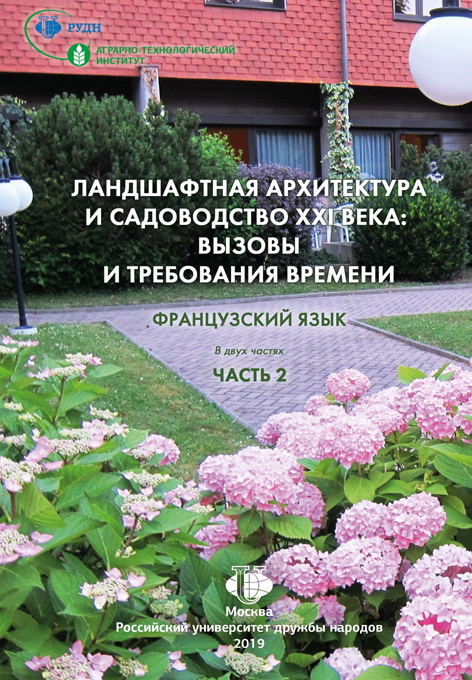
L международная выставка-презентация
научных, технических, учебно-методических и литературно-художественных изданий
Ландшафтная архитектура и садоводство XXI века: вызовы и требования времени: французский язык. В 2-х частях. Ч. 2

| Группа | Учебная литература |
|---|---|
| Область науки | Общественные науки |
| Название на русском языке | Ландшафтная архитектура и садоводство XXI века: вызовы и требования времени: французский язык. В 2-х частях. Ч. 2 |
| Авторы на русском языке | Жабо Н.И., Авдонина М.Ю., Нотина Е.А. |
| Название на английском языке | Landscape Architecture and Horticulture of the 21st Century: Challenges and Requirements of the Time: French. Part 2 |
| Авторы на английском языке | Zhabo N.I., Avdonina M.Yu., Notina E.A. |
| Вид издания на русском языке | учебник |
| Издательство на русском языке | Москва: РУДН, 2019. - 108 с. |
Abstract
The textbook for French learners future specialists in landscape architecture and horticulture is intended for Russian-speaking students of universities and for post-graduate students and contains authentic scientific and professionally-oriented materials on topical problems of modern gardening and landscape design.
The textbook consists of 2 parts.
The first part has 15 topics, including materials in French and assignments written in Russian which reveal the following: Innovative practices in horticulture and landscape design; A technological map of the profession; A portrait of a landscape designer; Environmental aspects of gardening; Specific soil, fertilizer, garden care; Combined biotechnologies; Principles of organization and characteristics of different types of gardens; Activities of a landscape designer.
The second part includes the following topics: Weather and gardening; Juridical questions, Landscape regulation (Cadastres; GIS; Paris permits to vegetate); Economical aspects (Cost; Bordereau, suivi, bons; proces verbales, fiches; Order). This part emphasizes negotiation skills providing with ways of expressing consent; confirmation; fear; refusal; encouragement; surprise; politeness.
The sections are accompanied by illustrations and photos mostly made by the authors.
In addition to assignments, the text book has a general block of video materials, as well as a glossary of professional vocabulary in three languages: French, Russian and English. Each section provides for the fulfillment of creative tasks, for example:
1) Describe in writen form the design of the garden on the scheme, suggest options for planting. Based on the conditions of the landscape, think through and describe stages of project implementation;
2) Make a presentation on the technology of a vertical garden. Think about which plants could enter the vertical garden of the hall of the Institute of Agrarian Techologies of the RUDN University. For your inspiration, here is an office interior in Paris;
3) Make recommendations for watering indoor plants (eg, orchids, violets, ferns);
4) Watch a video of your choice about one kind of soil (youtube addresses are listed here as examples). Following the same scheme, describe the composition of soils in any garden area, photograph the slice;
5) Read the short texts and put them in the form of a dialogue between an enthusiast who decided to earn a truffle breeding in Paris, and an official not willing to give permission for such a project.
Each topic contains a specially developed glossary, based on an associative-etymological series which contribute to the memorization of terminological units.
This textbook for learners of French for special purposes is aimed at forming communicative competence required for the implementation of educational, scientific and professional activities in the professional, linguistic and socio-cultural aspects and allowing to independently solve problems and issues arising during the process of educational and practical professional communication in a foreign language, namely to obtain the latest information on the design of space, the construction of a garden and the parks in France, the countries of Francophonie (Belgium, Switzerland, Canada, etc.), the organization of urbanization processes, the greening of cities, individual art objects, on the one hand, and the language skills and negotiation skills and business correspondence in French in the framework of international projects, delivering on the world level the achievements of the national scientific school on this specialty, on the other hand.
Assessment of foreign communicative competence is carried out in the form of tests, projects, oral and written interviews for all types of speech activity, Power Point presentations, infograms, video sessions and comics, written reports on individual work. The textbook was prepared by a team of authors with the participation of specialists of the agro-industrial complex.

МЕДАЛЬ «ЗА ВЕРНОСТЬ ТРАДИЦИЯМ ОТЕЧЕСТВЕННОГО ОБРАЗОВАНИЯ» С УДОСТОВЕРЕНИЕМ